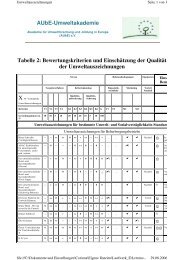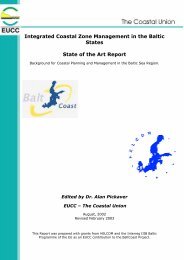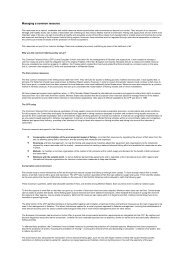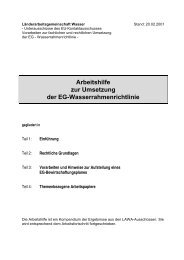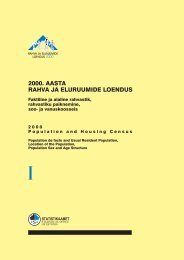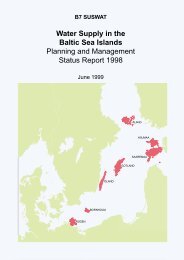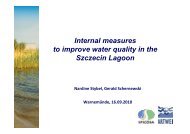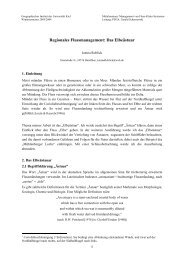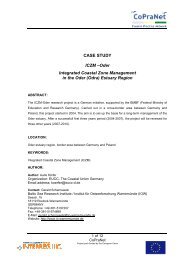The European environment - State and outlook ... - IKZM-D Lernen
The European environment - State and outlook ... - IKZM-D Lernen
The European environment - State and outlook ... - IKZM-D Lernen
Create successful ePaper yourself
Turn your PDF publications into a flip-book with our unique Google optimized e-Paper software.
Foreword<br />
This is the third state <strong>and</strong> <strong>outlook</strong> report on the<br />
<strong>European</strong> <strong>environment</strong> produced by the <strong>European</strong><br />
Environment Agency (EEA) since 1994. Looking back,<br />
the last report, published in 1999 concluded that,<br />
despite 25 years of Community <strong>environment</strong>al policy,<br />
<strong>environment</strong>al quality in the <strong>European</strong> Union (EU)<br />
was mixed <strong>and</strong> that the unsustainable development<br />
of some key economic sectors was the major barrier<br />
to further improvements. That remains the EEA's<br />
key conclusion, despite significant progress on some<br />
issues demonstrating that <strong>environment</strong>al policy works.<br />
Were we to fast-forward to the year 2010, it would<br />
be my strong hope that in its next state <strong>and</strong> <strong>outlook</strong><br />
report, the EEA would be able to report significant<br />
<strong>environment</strong>al improvements, not least as a result<br />
of reversing unsustainable trends in sectors such as<br />
energy, agriculture <strong>and</strong> transport.<br />
Much has of course changed in Europe since 1999, most<br />
notably through the biggest ever enlargement of the<br />
EU. Despite this <strong>and</strong> other considerable successes, the<br />
EU now recognises that it has to do more to convey<br />
to <strong>European</strong>s that it underst<strong>and</strong>s their concerns <strong>and</strong><br />
that it has credible strategies in place to address them.<br />
One response has been to reinvigorate the Lisbon<br />
agenda initially launched in 2000 with the target of<br />
creating new <strong>and</strong> better jobs through higher economic<br />
growth. <strong>The</strong> EU has set itself the deadline of 2010 for<br />
delivering on this agenda <strong>and</strong> against this backdrop<br />
<strong>environment</strong>al initiatives are being rigorously<br />
scrutinised. At the same time, opinion polls show<br />
that the <strong>European</strong> public believes that <strong>environment</strong><br />
protection policies are an incentive for innovation <strong>and</strong><br />
not an obstacle to economic performance. <strong>The</strong> evidence<br />
in this report shows that they are right.<br />
<strong>The</strong> years since 1999 have also witnessed the adoption<br />
of the EU's sustainable development strategy. At the<br />
UN World Summit on Sustainable Development in the<br />
summer of 2002, the EU showed global leadership by<br />
setting out its broad, long-term vision for the future.<br />
But long-term objectives must not mean postponing<br />
action now. In formulating policy today, Europe has<br />
an obligation to look beyond 2010 <strong>and</strong> beyond its<br />
own borders. As this report shows, the international<br />
stakes are high. Europe cannot continue down<br />
the path of achieving its short-term objectives by<br />
impacting disproportionately on the rest of the world's<br />
<strong>environment</strong> through its ecological footprint.<br />
Tackling clearly unsustainable trends in Europe will<br />
require real integration of <strong>environment</strong>al objectives<br />
across policy areas such as energy, transport,<br />
agriculture, industry <strong>and</strong> spatial planning. Consumers<br />
must also be given the information <strong>and</strong> incentives to<br />
change the way in which their households <strong>and</strong> lifestyles<br />
impact upon their local — <strong>and</strong> global — <strong>environment</strong>s.<br />
It is not easy to bring about such shifts in behaviour but<br />
many of the <strong>environment</strong>al improvements that we need<br />
in the coming years can only be brought about through<br />
such changes. At the same time, the EU must remain<br />
vigilant to ensure that the policy measures already in<br />
place are fully implemented <strong>and</strong> properly enforced.<br />
<strong>The</strong> <strong>European</strong> public's intuitive underst<strong>and</strong>ing that<br />
<strong>environment</strong>al protection <strong>and</strong> economic growth can<br />
go h<strong>and</strong> in h<strong>and</strong> is confirmed by this report. <strong>The</strong> same<br />
applies to the widely held view that prevention works<br />
better than cure. Many <strong>environment</strong>al problems stem<br />
from incorrect pricing of what we consume at the time<br />
we consume it. <strong>The</strong> challenge for <strong>European</strong> policymakers<br />
is to ensure that the real costs of pollution <strong>and</strong><br />
resource inefficiency are internalised into the prices<br />
of products <strong>and</strong> services, as opposed to later on at the<br />
end of the chain in the form of a pollution clean-up bill,<br />
damaged health or diminished ecosystems. <strong>The</strong> tools<br />
of the market can provide incentives to bring about<br />
some of the very necessary behavioural changes. And<br />
as the EEA has shown in some of its earlier reports, the<br />
cost of inaction can be many times the cost of sensible<br />
preventive measures.<br />
Some phenomena are more difficult to cost in<br />
conventional market terms. As societies we have come<br />
to rely on a range of ecosystem services upon which<br />
we have not traditionally placed monetary values.<br />
Healthy ecosystems deliver an abundance of free <strong>and</strong><br />
life-sustaining services such as productive l<strong>and</strong> <strong>and</strong><br />
soil, forest products, or other, sometimes less well<br />
recognised services, such as watershed protection<br />
<strong>and</strong> water filtration, flood protection or carbon<br />
storage. Our economies — like our societies — are<br />
8 <strong>The</strong> <strong>European</strong> <strong>environment</strong> | <strong>State</strong> <strong>and</strong> <strong>outlook</strong> 2005





